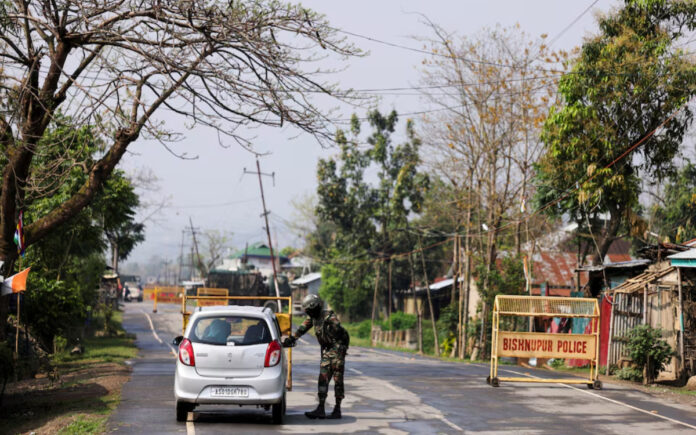Imphal: Militant groups from Myanmar, deeply embroiled in the country’s civil war, have been crossing back into India’s Manipur state, heightening the ongoing ethnic conflict between the Meitei and Kuki communities. Indian security officials report that these returning fighters bring with them advanced weaponry and combat experience, intensifying violence in a region already plagued by ethnic tensions.
Since May 2023, clashes between the predominantly Hindu Meitei and the largely Christian Kuki tribes have resulted in over 260 deaths and displaced more than 60,000 people. The conflict, stemming from a court ruling proposing government benefits for the Meiteis, has escalated into what critics deem the most significant law-and-order failure of Prime Minister Narendra Modi’s administration.
Myanmar Fighters Add Fuel to the Fire
Indian security officers, military personnel, and local politicians say that militants from both sides are leveraging their connections in Myanmar to acquire arms and reinforcements. While some Meitei insurgents fought alongside Myanmar’s ruling junta against anti-junta forces, the Kuki factions reportedly received backing from Kachin rebels and accessed weapon supplies from Wa state, known for its semi-autonomous status.
Yumnam Joykumar Singh, former Manipur police chief and deputy chief minister, noted that militants previously subdued by Indian forces have re-emerged. “The insurgents who we had controlled about 10 years ago are gaining relevance again,” he said.
In response to the escalating violence, the Indian government has deployed an additional 10,000 troops to Manipur, bringing the total number of military personnel in the region to nearly 67,000, supplemented by a 30,000-strong police force.
Weapons and Drugs: A Deadly Combination
The influx of militants has led to a proliferation of sophisticated arms, including M16s, M4A1s, and AK-47s, many of which were smuggled from Myanmar. Initial phases of the conflict saw weapons looted from Indian state armories, but recent seizures suggest that foreign-made arms are now entering Manipur.
Beyond arms trafficking, illegal poppy cultivation has become a significant source of funding for insurgents. While the plantations are primarily in Kuki-dominated hills, processing occurs in Meitei-controlled valley areas, according to Homen Thangjam, a political science professor. “Who pays them to grow is a mystery,” Thangjam added, highlighting the opaque financial operations supporting the conflict.
Rising Arrests and Intensifying Conflict
Security forces have arrested over 300 militants this year, with 200 being Meitei insurgents. Despite efforts to recover stolen arms and curb violence, the situation in Manipur remains precarious. Indian Army chief General Upendra Dwivedi noted in October that “the battle lines are getting hardened.”
Also Read | FAA Bans Drone Flights Over Key Sites in New Jersey, Expands Restrictions to New York
India has also initiated measures to secure its 1,600-kilometer border with Myanmar, including plans to construct a fence. However, the porous nature of the border complicates efforts to stem the flow of militants and arms.
Dual Conflicts in a Volatile Region
Former Indian ambassador to Myanmar Gautam Mukhopadhaya described the intertwined crises in Manipur and Myanmar as “two distinct conflicts,” with one seeking freedom from military rule and the other rooted in ethnic hostilities. “It can be assumed that some weapons transfers and trade in arms take place,” he remarked.
Also Read | Pakistan’s Missile Program Poses ‘Emerging Threat’ to the US, Warns Top White House Official
As the violence continues to spread, the federal government faces mounting pressure to stabilize the region and address the underlying causes of the conflict. However, with tensions escalating and external influences exacerbating the crisis, a resolution remains uncertain.



